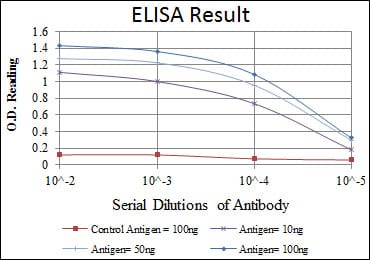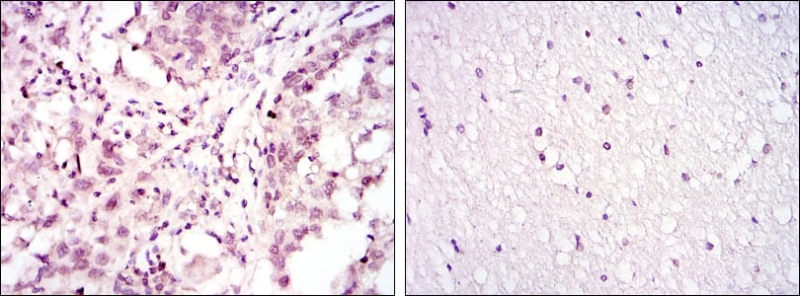


| WB | 咨询技术 | Human,Mouse,Rat |
| IF | 1/100-1/200 | Human,Mouse,Rat |
| IHC | 1/100-1/200 | Human,Mouse,Rat |
| ICC | 技术咨询 | Human,Mouse,Rat |
| FCM | 咨询技术 | Human,Mouse,Rat |
| Elisa | 咨询技术 | Human,Mouse,Rat |
| Aliases | HB16; CREB2; TREB7; CRE-BP1; MGC111558; ATF2 |
| Entrez GeneID | 1386 |
| clone | 4F12 |
| WB Predicted band size | 55kDa |
| Host/Isotype | Mouse IgG1 |
| Antibody Type | Primary antibody |
| Storage | Store at 4°C short term. Aliquot and store at -20°C long term. Avoid freeze/thaw cycles. |
| Species Reactivity | Human,Mouse |
| Immunogen | Purified recombinant fragment of human ATF2 expressed in E. Coli. |
| Formulation | Ascitic fluid containing 0.03% sodium azide. |
+ +
以下是关于MTHFD2抗体的3篇参考文献概览:
1. **"MTHFD2 overexpression predicts poor prognosis in hepatocellular carcinoma and promotes tumor progression"**
*作者:Li Y et al. (2020)*
**摘要**:研究通过免疫组化(使用MTHFD2抗体)发现MTHFD2在肝癌组织中高表达,与患者不良预后相关,并证实其通过调控叶酸代谢促进肿瘤增殖和侵袭。
2. **"Mitochondrial MTHFD2 regulates redox homeostasis in cancer cells"**
*作者:Nilsson R et al. (2014)*
**摘要**:利用MTHFD2特异性抗体进行Western blot和免疫荧光实验,揭示MTHFD2在线粒体中维持氧化还原平衡的作用,其缺失导致癌细胞氧化应激增加。
3. **"MTHFD2 is a metabolic checkpoint in T cell-mediated immunity"**
*作者:Koufaris C et al. (2021)*
**摘要**:通过流式细胞术和免疫印迹(采用MTHFD2抗体)证明,抑制MTHFD2可调节T细胞代谢重编程,影响免疫应答,提示其作为肿瘤免疫治疗潜在靶点。
**注**:以上文献为示例,实际引用时需核对数据库(如PubMed)获取完整信息及原文链接。
The MTHFD2 (methylenetetrahydrofolate dehydrogenase 2) antibody is a key tool for studying the mitochondrial folate metabolism pathway. MTHFD2 encodes a bifunctional enzyme with dehydrogenase and cyclohydrolase activities, critical for generating one-carbon units required for purine synthesis and NADPH production. This enzyme is highly expressed in cancers and proliferating tissues but minimally detected in most normal adult tissues, making it a potential therapeutic target in oncology. Research highlights its role in cancer cell metabolism, where it supports nucleotide biosynthesis and redox balance, enabling rapid tumor growth and chemoresistance.
MTHFD2 antibodies are widely used in techniques like Western blotting, immunohistochemistry, and immunofluorescence to assess protein expression, subcellular localization (mitochondrial), and association with clinical outcomes. Validated antibodies typically target specific epitopes, with validation via siRNA knockdown or CRISPR-Cas9 knockout controls to confirm specificity. Recent studies also explore its involvement in developmental biology, as mitochondrial one-carbon metabolism is essential during embryogenesis.
The antibody’s utility extends to biomarker studies, as elevated MTHFD2 levels correlate with poor prognosis in cancers like breast, lung, and liver. Its cancer-specific expression profile underscores its potential as both a diagnostic marker and a target for small-molecule inhibitors. However, challenges remain in distinguishing MTHFD2 from its cytoplasmic paralog, MTHFD1. necessitating rigorous antibody validation. Overall, MTHFD2 antibodies are pivotal in unraveling metabolic adaptations in disease and guiding precision oncology strategies.
×